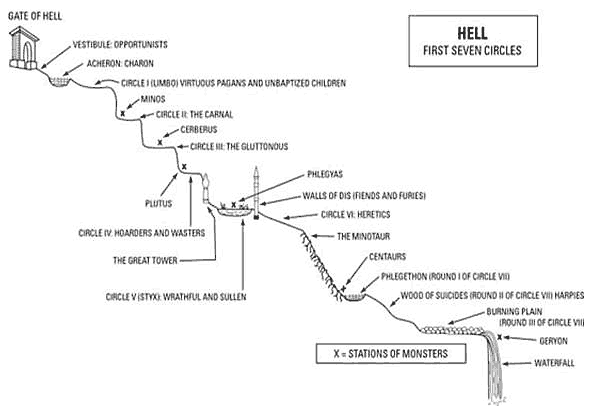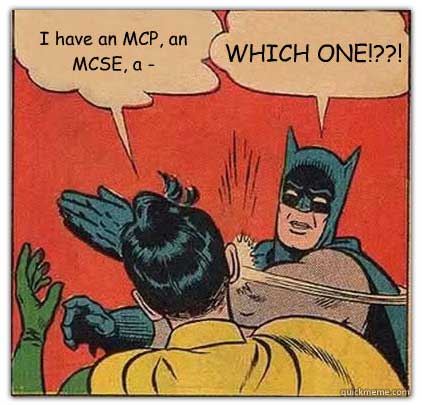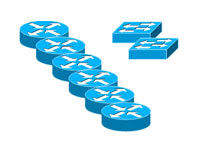By Thomas Chipman
“The network is slow” … four little words that are the bane of every network administrator. You will find that no matter how well a network design meets an organization’s current or projected needs, the day will surely come when those four dreaded words will find their way into a trouble ticket. If anecdotal evidence is to be believed, you will most likely hear those four words about 12 minutes before you had planned to head out for a weekend getaway; and they are usually uttered by your CEO as she is standing in your doorway with her laptop. Well, today’s that day and she isn’t going to leave your office until you’ve worked your magic. After all, that IS why she made YOU senior vice architect of network engineering.
Kelson Lawrence
Recent Posts
“The Network is Slow” – An Introduction to EtherChannel
Feb 28, 2013 11:57:00 AM / by Kelson Lawrence posted in networking, preventing accidental loops, slow network, etherchannel, introduction to etherchannel
The Seven Layers of Networking – Part I
Feb 27, 2013 8:18:00 AM / by Kelson Lawrence posted in The ISO OSI Reference Model, The Data Link Layer, The Network Layer, The Physical Layer, The Transport Layer, seven layers of networking
By John Oden
It’s difficult to have a conversation about networking without hearing someone refer to this layer or that layer. If you talk for more than a few minutes, you’ll soon hear someone say this device operates at Layer X or that device operates at Layer Y. We often begin these conversations assuming that everyone knows what these layers are and how they relate to the issues being discussed.
MS Windows Tips and Tricks | 2.7 Miscellaneous Windows 7 Features
Feb 25, 2013 10:39:00 AM / by Kelson Lawrence posted in Windows 7, tips and tricks, Miscellaneous Windows 7 Features
2.7.1 AppLocker (part 1)
By Val Bakh
AppLocker is a new type of Group Policy; it has been introduced in Windows 7 and Windows Server 2008 R2 and supersedes legacy software restriction policies (SRPs). In the Group Policy object (GPO) namespace, Applocker is located in a folder named Application Control Policies (ACPs). There is nothing else in that folder. Perhaps Microsoft is planning to add other types of ACPs in future versions of Windows, but for now, AppLocker is the one and only ACP.
Using Strong Passwords to Protect Your System from Orson Welles
Feb 22, 2013 8:38:00 AM / by Kelson Lawrence posted in strong passwords, zombie attack
By James Hanback
I know. I know. You've heard it a jillion times. Every time an activist, prankster, or malicious attacker breaks into a high-profile system, the public is treated to a litany of (sometimes conflicting) advice about steps the victim could have taken that would have prevented it from happening. Most recently, a Montana television station hit the news after someone apparently guessed the password to the station's Emergency Alert System (EAS) device and managed to broadcast an alert that might remind horror movies buffs of a scene from the old George Romero film Night of the Living Dead. "Civil authorities in your area have reported that the bodies of the dead are rising from their graves and attacking the living," the prankster stated over the air.
The New MCSE: Same as the Old MCSE? An HR Practitioner’s Perspective
Feb 21, 2013 11:04:00 AM / by Kelson Lawrence posted in interviewing, PHR, hiring
Do I Need A Style Guide?
Feb 19, 2013 8:48:00 AM / by Kelson Lawrence posted in style guide, authoring a practice exam
By K. Acheson
If you are a writer or an editor, you have undoubtedly asked yourself at least once whether you need a style guide. After all, there are countless style guides available, including The Associated Press Stylebook and Briefing on Media Law (AP Stylebook), The Chicago Manual of Style (CMS), The Elements of Style (EoS), The Gregg Reference Manual (GRM), the Microsoft Manual of Style for Technical Publications (MMOS), and many more. I searched for "writing style guide reference manual" in Amazon's bookstore and, in a quick scan of the books, I found over 40 different style guides; that was only a fraction of the 400 English results. You get the idea – there are tons of options. So someone thinks style guides are a good idea. But why?
“Why do you do what you do at Boson?”
Feb 18, 2013 2:09:00 PM / by Kelson Lawrence posted in practice tests, Delana Hallstedt, practice exam author, save money
By Delana Hallstedt
President’s Day finds me loading up my son to bring him into the office with me because my husband and I clearly failed to be on the same page in regards to daycare for this school holiday. Nothing a quiet corner in my office with a laptop, iPod touch, and a cup of hot cocoa can’t handle. We’ve got this!
Cisco Takes Steps to Make EIGRP Open
Feb 14, 2013 11:18:00 AM / by Kelson Lawrence posted in Cisco, EIGRP, Interior Gateway Protocol, igp, Enhanced Interior Gateway Routing Protocol
By John Oden
So you are reviewing some practice test questions as you prepare for a Cisco exam and you come across a scenario that states something like, “…and all the routers in the topology are manufactured by Cisco.” You immediately shift your focus and begin to examine the available choices, scanning for anything that has to do with the Enhanced Interior Gateway Routing Protocol (EIGRP). We’ve all done that, right?
CDP Basics – Intro to the Cisco Discovery Protocol
Feb 13, 2013 12:32:00 PM / by Kelson Lawrence posted in CDP, configuring CDP, Cisco Discovery Protocol, how CDP works, CDP Prerequisites and Restrictions
Do I Need a Proofreader?
Feb 8, 2013 10:23:00 AM / by Kelson Lawrence posted in proofreading, writing articles, writing tips
By K. Acheson
A proofreader provides an essential service — one you might not realize is necessary until you spot an error or inconsistency after your work is published. Here is a list of some of the benefits of having a proofreader review your work:
1. A good proofreader looks for spelling and grammar issues your word processing program likely won't catch.











